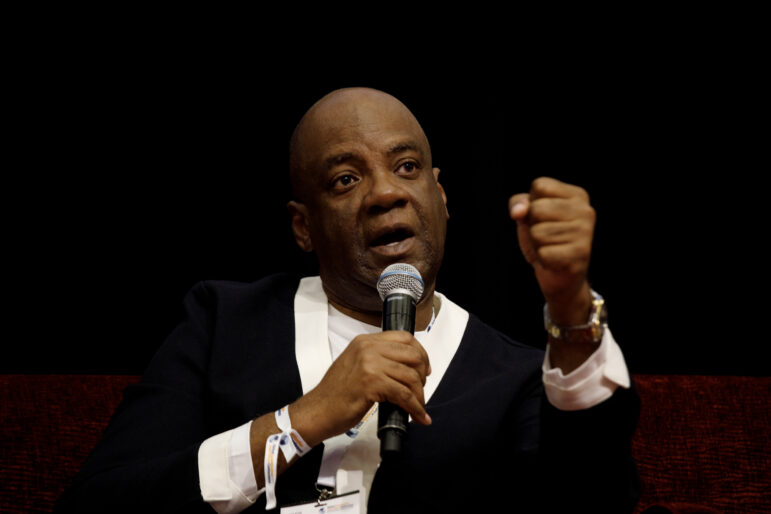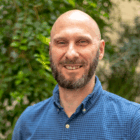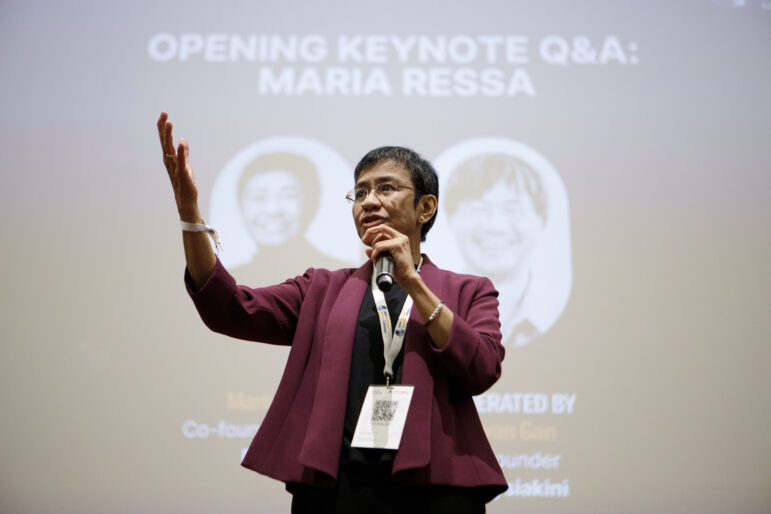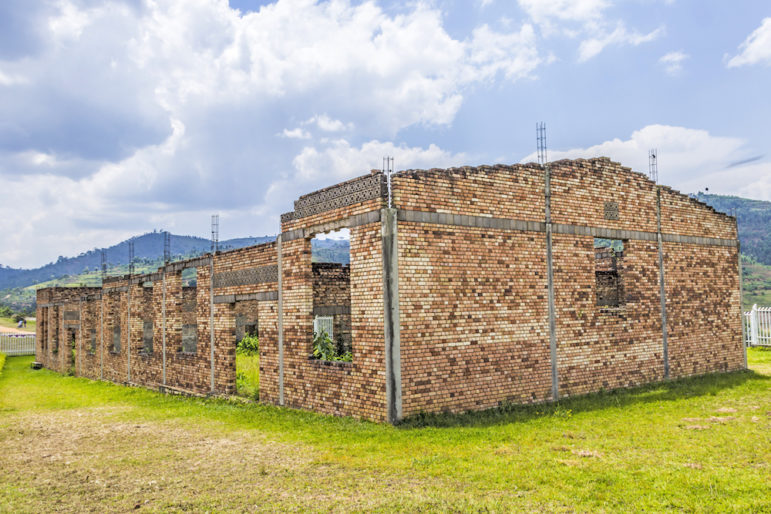

The international lawyer Dr. Charles A. Adeogun-Phillips addressed the audience at GIJC25. Image: Samsul Said, Alt Studio for GIJN
At first glance, justice appeared to have been served this year when the US returned $52 million to Nigeria for a US-based superyacht that a former Nigerian government minister had allegedly purchased with bribe money.
The Galactica Star was yet another stolen asset stashed in the West — looted from a country that needs every penny of its own money for urgent projects, from new schools to poverty alleviation.
However, attendees at the 14th Global Investigative Journalism Conference (GIJC25) heard from an expert that this was just one of numerous cases in which developed countries offer to return only a portion of assets stolen from developing countries — and also impose demands on how it is spent.
In a session to help journalists understand international legal mechanisms related to genocide, grand corruption, and asset recovery, one of the world’s eminent international law practitioners, Dr. Charles A. Adeogun-Phillips, revealed a series of weak points and biases in international justice institutions that journalists need to understand and investigate.
A former lead genocide prosecutor and head of special investigations at the United Nations, Adeogun-Phillips has deep experience investigating and prosecuting high-level international crime, from war atrocities to major corporate malfeasance.
His new role as vice-chairman of the Board of Integrity Initiatives International (III) — a Boston-based NGO advocating for the establishment of the proposed International Anti-Corruption Court (IACC) — could play a role in stripping Western countries of the proceeds of Global South corruption and returning the money to the needy nations where it was taken from.
A lack of good laws is not the problem. As the IACC website explains: “The 191 parties to the United Nations Convention against Corruption (UNCAC) each have laws criminalizing corrupt conduct. Yet kleptocrats enjoy impunity because they control the administration of justice in the countries that they rule.”
Said Adeogun-Phillips: “The III was set up by two eminent judges, who decided it was time for the world to create an institution to deal with grand corruption, when countries were unable or unwilling to do so.”
Adeogun-Phillips had already reached the same conclusion about this need, having been appointed by Nigeria’s government in 2016 to prosecute 12 of the nation’s highest-ranking judges — only to resign when he found his government brief fraught with interference and political score-settling. “That led to me realizing that those countries that were not able to prosecute corruption domestically needed an alternative: an international institution.”
Adeogun-Phillips described how his personal experience in Nigeria helped add a major financial justice element to the proposed IACC that is meant to tackle Western-imposed conditions, such as those in the Galactica Star case.
“Yes, I understand criminal convictions may serve as a deterrent to corrupt acts — but the reality is I live in a victim country in Nigeria,” he said. “I wake up to my grandmother not having piped-in water; to not having electricity; to not having infrastructure. I wake up to the ills of corruption every day. So I said to my colleagues at III: ‘This is a grand idea, but criminal convictions are not going to build infrastructure or schools in my country.’ I said: ‘We want the money back. If you want me to support this, it has to adjudicate over competing interests in the recovery of stolen assets.’”
Secrecy Jurisdiction Tactics for Hiding and Litigating

The panel, with Mada Masr’s Lina Attalah (left) and GIJN Executive Director Emilia Díaz-Struck. Image: Samsul Said, Alt Studio for GIJN
The session was moderated by Lina Attalah, publisher and founding editor of Egypt’s award-winning Mada Masr newsroom, and Emilia Díaz-Struck, GIJN executive director and former Latin American coordinator at the International Consortium of Investigative Journalists (ICIJ).
Díaz-Struck asked: “When we’re talking about illicit financial flows, sometimes offshore jurisdictions and shell companies emerge. What cooperation do you get from countries that are secrecy jurisdictions in terms of providing information to trace the assets?”
“Not very encouraging,” levels of cooperation, said Adeogun-Phillips, adding that it had taken a war — Russia’s invasion of Ukraine — for the United Kingdom to finally crack down on rampant money laundering and asset hiding there.
He said reporters should understand that the problem with Western conditions on asset recovery was that Global South nations already have to jump through an astonishing and expensive array of legal hoops to get back money looted from their coffers. He described how competing parties emerge from the woodwork to make claims on the assets in Western secrecy jurisdictions, stretching the recovery time to years or decades. As an example, he said Nigeria has waited 25 years to recover only US$1 billion of the US$5 billion smuggled to Western countries by a former president.
Challenge and Pitfalls of Genocide Prosecution
Pointing out that there has been a historical bias in international law in favor of developed countries, Attalah asked how this bias manifests in modern charges of genocide.
“What sets a genocide apart for prosecutors is the obligation to demonstrate to the court that there was an intention to destroy, in whole or in part, members of a certain group, based on certain enumerated acts,” he explained.
“As we speak, the United States government is alleging the occurrence of a Christian genocide in my country [Nigeria.] And I laugh. If only they knew what it takes to prosecute this crime, you wouldn’t make this allegation lightly. Now, the Nigerian president’s wife is not only a Christian, she’s a pastor; the former vice president is a pastor. The country is almost evenly divided between Christians and Muslims. So what would be the basis of a claim of Christian genocide without the active participation of the Nigerian state?”
Attalah asked whether a new court might be established to adjudicate charges against Israel for actions in Gaza.
“There is this concept of ‘trial in absentia’ — where the court says, ‘If we manage to apprehend the suspect, we’ll try them again,’” he explained. “Imagine the resources pumped into a court that has no defendants. That’s what’s going to happen if we set up a tribunal for Gaza — there would be no defendants.”
As lead prosecutor, Adeogun-Phillips secured 12 genocide convictions against defendants in the International Criminal Tribunal for Rwanda between 1998 and 2010 — including leading figures in politics, the military, and the clergy.
However, he told the GIJC25 audience that his United Nations investigative team also made key mistakes — the same mistakes he sees European investigators making in current war crimes investigations in the Democratic Republic of the Congo. For various reasons — including a then-UN rule to avoid using local investigators — he said his team of Rwanda genocide investigators had been all male, and all foreign.
“Looking into gender-specific crimes, it became apparent that rape was used as a tool of war in the genocide,” he explained. “We made errors. When our [male] investigators went into the field to interview witnesses, many [women] were willing to testify about what happened to other women, but were reluctant to talk about what happened to them. During trial prep, I’d routinely ask the witnesses: ‘How come you escaped being raped?’ They’d turn to the interpreter — normally a woman — and say: ‘Actually, I was raped too. I felt most uncomfortable talking to men about it.’”
He said a second error was a lack of understanding of cultural context, due to a moratorium on Rwandan team members.
“We were told we could not hire locals because we didn’t know which side they were on,” he said. “You lose cultural understanding that way, and I think the same mistake is now being made in the [DRC] — sending European investigators to investigate massacres there. Think of it: In a Rwandan village, a person might see one car in a month. Imagine how we would blow the cover of witnesses when we turned up in our UN jeeps, looking very foreign — neighbors saying, ‘What’s going on there?’ We had to learn this.”
 Rowan Philp is GIJN’s global reporter and impact editor. A former chief reporter for South Africa’s Sunday Times, he has reported on news, politics, corruption, and conflict from more than two dozen countries around the world, and has also served as an assignments editor for newsrooms in the UK, US, and Africa.
Rowan Philp is GIJN’s global reporter and impact editor. A former chief reporter for South Africa’s Sunday Times, he has reported on news, politics, corruption, and conflict from more than two dozen countries around the world, and has also served as an assignments editor for newsrooms in the UK, US, and Africa.









